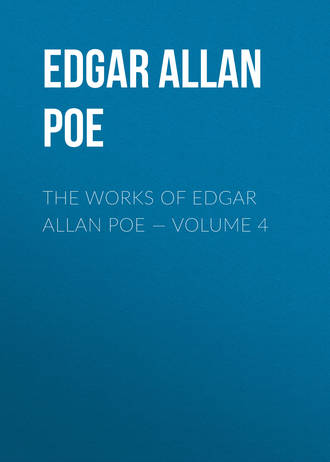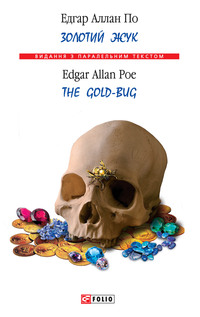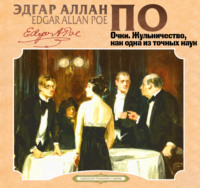 полная версия
полная версияThe Works of Edgar Allan Poe — Volume 4
If there is any thing on earth I hate, it is a genius. Your geniuses are all arrant asses — the greater the genius the greater the ass — and to this rule there is no exception whatever. Especially, you cannot make a man of business out of a genius, any more than money out of a Jew, or the best nutmegs out of pine-knots. The creatures are always going off at a tangent into some fantastic employment, or ridiculous speculation, entirely at variance with the “fitness of things,” and having no business whatever to be considered as a business at all. Thus you may tell these characters immediately by the nature of their occupations. If you ever perceive a man setting up as a merchant or a manufacturer, or going into the cotton or tobacco trade, or any of those eccentric pursuits; or getting to be a drygoods dealer, or soap-boiler, or something of that kind; or pretending to be a lawyer, or a blacksmith, or a physician — any thing out of the usual way — you may set him down at once as a genius, and then, according to the rule-of-three, he’s an ass.
Now I am not in any respect a genius, but a regular business man. My Day-book and Ledger will evince this in a minute. They are well kept, though I say it myself; and, in my general habits of accuracy and punctuality, I am not to be beat by a clock. Moreover, my occupations have been always made to chime in with the ordinary habitudes of my fellowmen. Not that I feel the least indebted, upon this score, to my exceedingly weak-minded parents, who, beyond doubt, would have made an arrant genius of me at last, if my guardian angel had not come, in good time, to the rescue. In biography the truth is every thing, and in autobiography it is especially so — yet I scarcely hope to be believed when I state, however solemnly, that my poor father put me, when I was about fifteen years of age, into the counting-house of what be termed “a respectable hardware and commission merchant doing a capital bit of business!” A capital bit of fiddlestick! However, the consequence of this folly was, that in two or three days, I had to be sent home to my button-headed family in a high state of fever, and with a most violent and dangerous pain in the sinciput, all around about my organ of order. It was nearly a gone case with me then — just touch-and-go for six weeks — the physicians giving me up and all that sort of thing. But, although I suffered much, I was a thankful boy in the main. I was saved from being a “respectable hardware and commission merchant, doing a capital bit of business,” and I felt grateful to the protuberance which had been the means of my salvation, as well as to the kindhearted female who had originally put these means within my reach.
The most of boys run away from home at ten or twelve years of age, but I waited till I was sixteen. I don’t know that I should have gone even then, if I had not happened to hear my old mother talk about setting me up on my own hook in the grocery way. The grocery way! — only think of that! I resolved to be off forthwith, and try and establish myself in some decent occupation, without dancing attendance any longer upon the caprices of these eccentric old people, and running the risk of being made a genius of in the end. In this project I succeeded perfectly well at the first effort, and by the time I was fairly eighteen, found myself doing an extensive and profitable business in the Tailor’s Walking-Advertisement line.
I was enabled to discharge the onerous duties of this profession, only by that rigid adherence to system which formed the leading feature of my mind. A scrupulous method characterized my actions as well as my accounts. In my case it was method — not money — which made the man: at least all of him that was not made by the tailor whom I served. At nine, every morning, I called upon that individual for the clothes of the day. Ten o’clock found me in some fashionable promenade or other place of public amusement. The precise regularity with which I turned my handsome person about, so as to bring successively into view every portion of the suit upon my back, was the admiration of all the knowing men in the trade. Noon never passed without my bringing home a customer to the house of my employers, Messrs. Cut & Comeagain. I say this proudly, but with tears in my eyes — for the firm proved themselves the basest of ingrates. The little account, about which we quarreled and finally parted, cannot, in any item, be thought overcharged, by gentlemen really conversant with the nature of the business. Upon this point, however, I feel a degree of proud satisfaction in permitting the reader to judge for himself. My bill ran thus:
Messrs. Cut & Comeagain, Merchant Tailors.
To Peter Proffit, Walking Advertiser, Drs.
JULY 10. — to promenade, as usual and customer brought home... $00 25
JULY 11. — To do do do 25
JULY 12. — To one lie, second class; damaged black cloth sold for invisible green..................... 25
JULY 13. — To one lie, first class, extra quality and size; recommended milled satinet as broadcloth......... 75
JULY 20. — To purchasing bran new paper shirt collar or dickey, to set off gray Petersham............... 02
AUG. 15. — To wearing double-padded bobtail frock, (thermometer 106 in the shade).................. 25
AUG. 16. — Standing on one leg three hours, to show off new-style strapped pants at 12 1/2 cents per leg per hour..... 37 1/2
AUG. 17. — To promenade, as usual, and large customer brought (fat man)....................... 50
AUG. 18. — To do do (medium size)...... 25
AUG. 19. — To do do (small man and bad pay)... 06
TOTAL [sic] $2 95 1/2
The item chiefly disputed in this bill was the very moderate charge of two pennies for the dickey. Upon my word of honor, this was not an unreasonable price for that dickey. It was one of the cleanest and prettiest little dickeys I ever saw; and I have good reason to believe that it effected the sale of three Petershams. The elder partner of the firm, however, would allow me only one penny of the charge, and took it upon himself to show in what manner four of the same sized conveniences could be got out of a sheet of foolscap. But it is needless to say that I stood upon the principle of the thing. Business is business, and should be done in a business way. There was no system whatever in swindling me out of a penny — a clear fraud of fifty per cent — no method in any respect. I left at once the employment of Messrs. Cut & Comeagain, and set up in the Eye-Sore line by myself — one of the most lucrative, respectable, and independent of the ordinary occupations.
My strict integrity, economy, and rigorous business habits, here again came into play. I found myself driving a flourishing trade, and soon became a marked man upon ‘Change. The truth is, I never dabbled in flashy matters, but jogged on in the good old sober routine of the calling — a calling in which I should, no doubt, have remained to the present hour, but for a little accident which happened to me in the prosecution of one of the usual business operations of the profession. Whenever a rich old hunks or prodigal heir or bankrupt corporation gets into the notion of putting up a palace, there is no such thing in the world as stopping either of them, and this every intelligent person knows. The fact in question is indeed the basis of the Eye-Sore trade. As soon, therefore, as a building-project is fairly afoot by one of these parties, we merchants secure a nice corner of the lot in contemplation, or a prime little situation just adjoining, or tight in front. This done, we wait until the palace is half-way up, and then we pay some tasty architect to run us up an ornamental mud hovel, right against it; or a Down-East or Dutch Pagoda, or a pig-sty, or an ingenious little bit of fancy work, either Esquimau, Kickapoo, or Hottentot. Of course we can’t afford to take these structures down under a bonus of five hundred per cent upon the prime cost of our lot and plaster. Can we? I ask the question. I ask it of business men. It would be irrational to suppose that we can. And yet there was a rascally corporation which asked me to do this very thing — this very thing! I did not reply to their absurd proposition, of course; but I felt it a duty to go that same night, and lamp-black the whole of their palace. For this the unreasonable villains clapped me into jail; and the gentlemen of the Eye-Sore trade could not well avoid cutting my connection when I came out.
The Assault-and-Battery business, into which I was now forced to adventure for a livelihood, was somewhat ill-adapted to the delicate nature of my constitution; but I went to work in it with a good heart, and found my account here, as heretofore, in those stern habits of methodical accuracy which had been thumped into me by that delightful old nurse — I would indeed be the basest of men not to remember her well in my will. By observing, as I say, the strictest system in all my dealings, and keeping a well-regulated set of books, I was enabled to get over many serious difficulties, and, in the end, to establish myself very decently in the profession. The truth is, that few individuals, in any line, did a snugger little business than I. I will just copy a page or so out of my Day-Book; and this will save me the necessity of blowing my own trumpet — a contemptible practice of which no high-minded man will be guilty. Now, the Day-Book is a thing that don’t lie.
“Jan. 1. — New Year’s Day. Met Snap in the street, groggy. Mem — he’ll do. Met Gruff shortly afterward, blind drunk. Mem — he’ll answer, too. Entered both gentlemen in my Ledger, and opened a running account with each.
“Jan. 2. — Saw Snap at the Exchange, and went up and trod on his toe. Doubled his fist and knocked me down. Good! — got up again. Some trifling difficulty with Bag, my attorney. I want the damages at a thousand, but he says that for so simple a knock down we can’t lay them at more than five hundred. Mem — must get rid of Bag — no system at all.
“Jan. 3 — Went to the theatre, to look for Gruff. Saw him sitting in a side box, in the second tier, between a fat lady and a lean one. Quizzed the whole party through an opera-glass, till I saw the fat lady blush and whisper to G. Went round, then, into the box, and put my nose within reach of his hand. Wouldn’t pull it — no go. Blew it, and tried again — no go. Sat down then, and winked at the lean lady, when I had the high satisfaction of finding him lift me up by the nape of the neck, and fling me over into the pit. Neck dislocated, and right leg capitally splintered. Went home in high glee, drank a bottle of champagne, and booked the young man for five thousand. Bag says it’ll do.
“Feb. 15 — Compromised the case of Mr. Snap. Amount entered in Journal — fifty cents — which see.
“Feb. 16. — Cast by that ruffian, Gruff, who made me a present of five dollars. Costs of suit, four dollars and twenty-five cents. Nett profit, — see Journal, — seventy-five cents.”
Now, here is a clear gain, in a very brief period, of no less than one dollar and twenty-five cents — this is in the mere cases of Snap and Gruff; and I solemnly assure the reader that these extracts are taken at random from my Day-Book.
It’s an old saying, and a true one, however, that money is nothing in comparison with health. I found the exactions of the profession somewhat too much for my delicate state of body; and, discovering, at last, that I was knocked all out of shape, so that I didn’t know very well what to make of the matter, and so that my friends, when they met me in the street, couldn’t tell that I was Peter Proffit at all, it occurred to me that the best expedient I could adopt was to alter my line of business. I turned my attention, therefore, to Mud-Dabbling, and continued it for some years.
The worst of this occupation is, that too many people take a fancy to it, and the competition is in consequence excessive. Every ignoramus of a fellow who finds that he hasn’t brains in sufficient quantity to make his way as a walking advertiser, or an eye-sore prig, or a salt-and-batter man, thinks, of course, that he’ll answer very well as a dabbler of mud. But there never was entertained a more erroneous idea than that it requires no brains to mud-dabble. Especially, there is nothing to be made in this way without method. I did only a retail business myself, but my old habits of system carried me swimmingly along. I selected my street-crossing, in the first place, with great deliberation, and I never put down a broom in any part of the town but that. I took care, too, to have a nice little puddle at hand, which I could get at in a minute. By these means I got to be well known as a man to be trusted; and this is one-half the battle, let me tell you, in trade. Nobody ever failed to pitch me a copper, and got over my crossing with a clean pair of pantaloons. And, as my business habits, in this respect, were sufficiently understood, I never met with any attempt at imposition. I wouldn’t have put up with it, if I had. Never imposing upon any one myself, I suffered no one to play the possum with me. The frauds of the banks of course I couldn’t help. Their suspension put me to ruinous inconvenience. These, however, are not individuals, but corporations; and corporations, it is very well known, have neither bodies to be kicked nor souls to be damned.
I was making money at this business when, in an evil moment, I was induced to merge it in the Cur-Spattering — a somewhat analogous, but, by no means, so respectable a profession. My location, to be sure, was an excellent one, being central, and I had capital blacking and brushes. My little dog, too, was quite fat and up to all varieties of snuff. He had been in the trade a long time, and, I may say, understood it. Our general routine was this: — Pompey, having rolled himself well in the mud, sat upon end at the shop door, until he observed a dandy approaching in bright boots. He then proceeded to meet him, and gave the Wellingtons a rub or two with his wool. Then the dandy swore very much, and looked about for a boot-black. There I was, full in his view, with blacking and brushes. It was only a minute’s work, and then came a sixpence. This did moderately well for a time; — in fact, I was not avaricious, but my dog was. I allowed him a third of the profit, but he was advised to insist upon half. This I couldn’t stand — so we quarrelled and parted.
I next tried my hand at the Organ-Grinding for a while, and may say that I made out pretty well. It is a plain, straightforward business, and requires no particular abilities. You can get a music-mill for a mere song, and to put it in order, you have but to open the works, and give them three or four smart raps with a hammer. In improves the tone of the thing, for business purposes, more than you can imagine. This done, you have only to stroll along, with the mill on your back, until you see tanbark in the street, and a knocker wrapped up in buckskin. Then you stop and grind; looking as if you meant to stop and grind till doomsday. Presently a window opens, and somebody pitches you a sixpence, with a request to “Hush up and go on,” etc. I am aware that some grinders have actually afforded to “go on” for this sum; but for my part, I found the necessary outlay of capital too great to permit of my “going on” under a shilling.
At this occupation I did a good deal; but, somehow, I was not quite satisfied, and so finally abandoned it. The truth is, I labored under the disadvantage of having no monkey — and American streets are so muddy, and a Democratic rabble is so obstrusive, and so full of demnition mischievous little boys.
I was now out of employment for some months, but at length succeeded, by dint of great interest, in procuring a situation in the Sham-Post. The duties, here, are simple, and not altogether unprofitable. For example: — very early in the morning I had to make up my packet of sham letters. Upon the inside of each of these I had to scrawl a few lines on any subject which occurred to me as sufficiently mysterious — signing all the epistles Tom Dobson, or Bobby Tompkins, or anything in that way. Having folded and sealed all, and stamped them with sham postmarks — New Orleans, Bengal, Botany Bay, or any other place a great way off — I set out, forthwith, upon my daily route, as if in a very great hurry. I always called at the big houses to deliver the letters, and receive the postage. Nobody hesitates at paying for a letter — especially for a double one — people are such fools — and it was no trouble to get round a corner before there was time to open the epistles. The worst of this profession was, that I had to walk so much and so fast; and so frequently to vary my route. Besides, I had serious scruples of conscience. I can’t bear to hear innocent individuals abused — and the way the whole town took to cursing Tom Dobson and Bobby Tompkins was really awful to hear. I washed my hands of the matter in disgust.
My eighth and last speculation has been in the Cat-Growing way. I have found that a most pleasant and lucrative business, and, really, no trouble at all. The country, it is well known, has become infested with cats — so much so of late, that a petition for relief, most numerously and respectably signed, was brought before the Legislature at its late memorable session. The Assembly, at this epoch, was unusually well-informed, and, having passed many other wise and wholesome enactments, it crowned all with the Cat-Act. In its original form, this law offered a premium for cat-heads (fourpence a-piece), but the Senate succeeded in amending the main clause, so as to substitute the word “tails” for “heads.” This amendment was so obviously proper, that the House concurred in it nem. con.
As soon as the governor had signed the bill, I invested my whole estate in the purchase of Toms and Tabbies. At first I could only afford to feed them upon mice (which are cheap), but they fulfilled the scriptural injunction at so marvellous a rate, that I at length considered it my best policy to be liberal, and so indulged them in oysters and turtle. Their tails, at a legislative price, now bring me in a good income; for I have discovered a way, in which, by means of Macassar oil, I can force three crops in a year. It delights me to find, too, that the animals soon get accustomed to the thing, and would rather have the appendages cut off than otherwise. I consider myself, therefore, a made man, and am bargaining for a country seat on the Hudson.
THE LANDSCAPE GARDEN
The garden like a lady fair was cut That lay as if she slumbered in delight, And to the open skies her eyes did shut; The azure fields of heaven were ‘sembled right In a large round set with flow’rs of light: The flowers de luce and the round sparks of dew That hung upon their azure leaves, did show Like twinkling stars that sparkle in the ev’ning blue. — GILES FLETCHERNO MORE remarkable man ever lived than my friend, the young Ellison. He was remarkable in the entire and continuous profusion of good gifts ever lavished upon him by fortune. From his cradle to his grave, a gale of the blandest prosperity bore him along. Nor do I use the word Prosperity in its mere wordly or external sense. I mean it as synonymous with happiness. The person of whom I speak, seemed born for the purpose of foreshadowing the wild doctrines of Turgot, Price, Priestley, and Condorcet — of exemplifying, by individual instance, what has been deemed the mere chimera of the perfectionists. In the brief existence of Ellison, I fancy, that I have seen refuted the dogma — that in man’s physical and spiritual nature, lies some hidden principle, the antagonist of Bliss. An intimate and anxious examination of his career, has taught me to understand that, in general, from the violation of a few simple laws of Humanity, arises the Wretchedness of mankind; that, as a species, we have in our possession the as yet unwrought elements of Content, — and that even now, in the present blindness and darkness of all idea on the great question of the Social Condition, it is not impossible that Man, the individual, under certain unusual and highly fortuitous conditions, may be happy.
With opinions such as these was my young friend fully imbued; and thus is it especially worthy of observation that the uninterrupted enjoyment which distinguished his life was in great part the result of preconcert. It is, indeed evident, that with less of the instinctive philosophy which, now and then, stands so well in the stead of experience, Mr. Ellison would have found himself precipitated, by the very extraordinary successes of his life, into the common vortex of Unhappiness which yawns for those of preeminent endowments. But it is by no means my present object to pen an essay on Happiness. The ideas of my friend may be summed up in a few words. He admitted but four unvarying laws, or rather elementary principles, of Bliss. That which he considered chief, was (strange to say!) the simple and purely physical one of free exercise in the open air. “The health,” he said, “attainable by other means than this is scarcely worth the name.” He pointed to the tillers of the earth — the only people who, as a class, are proverbially more happy than others — and then he instanced the high ecstasies of the fox-hunter. His second principle was the love of woman. His third was the contempt of ambition. His fourth was an object of unceasing pursuit; and he held that, other things being equal, the extent of happiness was proportioned to the spirituality of this object.
I have said that Ellison was remarkable in the continuous profusion of good gifts lavished upon him by Fortune. In personal grace and beauty he exceeded all men. His intellect was of that order to which the attainment of knowledge is less a labor than a necessity and an intuition. His family was one of the most illustrious of the empire. His bride was the loveliest and most devoted of women. His possessions had been always ample; but, upon the attainment of his one and twentieth year, it was discovered that one of those extraordinary freaks of Fate had been played in his behalf which startle the whole social world amid which they occur, and seldom fail radically to alter the entire moral constitution of those who are their objects. It appears that about one hundred years prior to Mr. Ellison’s attainment of his majority, there had died, in a remote province, one Mr. Seabright Ellison. This gentlemen had amassed a princely fortune, and, having no very immediate connexions, conceived the whim of suffering his wealth to accumulate for a century after his decease. Minutely and sagaciously directing the various modes of investment, he bequeathed the aggregate amount to the nearest of blood, bearing the name Ellison, who should be alive at the end of the hundred years. Many futile attempts had been made to set aside this singular bequest; their ex post facto character rendered them abortive; but the attention of a jealous government was aroused, and a decree finally obtained, forbidding all similar accumulations. This act did not prevent young Ellison, upon his twenty-first birth-day, from entering into possession, as the heir of his ancestor, Seabright, of a fortune of four hundred and fifty millions of dollars. {*1}
When it had become definitely known that such was the enormous wealth inherited, there were, of course, many speculations as to the mode of its disposal. The gigantic magnitude and the immediately available nature of the sum, dazzled and bewildered all who thought upon the topic. The possessor of any appreciable amount of money might have been imagined to perform any one of a thousand things. With riches merely surpassing those of any citizen, it would have been easy to suppose him engaging to supreme excess in the fashionable extravagances of his time; or busying himself with political intrigues; or aiming at ministerial power, or purchasing increase of nobility, or devising gorgeous architectural piles; or collecting large specimens of Virtu; or playing the munificent patron of Letters and Art; or endowing and bestowing his name upon extensive institutions of charity. But, for the inconceivable wealth in the actual possession of the young heir, these objects and all ordinary objects were felt to be inadequate. Recourse was had to figures; and figures but sufficed to confound. It was seen, that even at three per cent, the annual income of the inheritance amounted to no less than thirteen millions and five hundred thousand dollars; which was one million and one hundred and twenty-five thousand per month; or thirty-six thousand, nine hundred and eighty-six per day, or one thousand five hundred and forty-one per hour, or six and twenty dollars for every minute that flew. Thus the usual track of supposition was thoroughly broken up. Men knew not what to imagine. There were some who even conceived that Mr. Ellison would divest himself forthwith of at least two-thirds of his fortune as of utterly superfluous opulence; enriching whole troops of his relatives by division of his superabundance.









